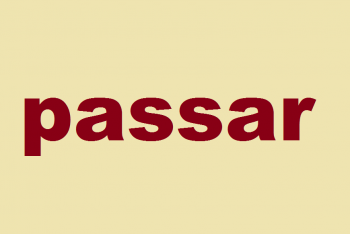The verb ‘passar’ in Portuguese Posted by carol on Jul 8, 2017 in Grammar, Learning, Vocabulary
Olá a todos! Hi everybody! Vocês estão passando bem? Are you doing alright?

Passar is a very common, versatile word in the Portuguese language. There are many different ways to use it, so today’s post is dedicated to showing you how to employ and understand how the verb works. Vamos passar para os exemplos! Let’s get to examples!
- Passar in the sense of spending, remaining:
- Meu filho se mudou para a Inglaterra e passou três anos lá – My son moved to England and spent three years there
- Passei o dia inteiro estudando – I spent the whole day studying
- Passar in the sense of being over, ending
- O pior já passou – The worst is over
- Estava com dor de cabeça, mas já passou – I had a headache, but now it’s gone
- Passar in the sense of changing one’s attitude
- De repente, ela passou a me ignorar – She suddenly started ignoring me
- Para perder peso, passei a ir a academia todos os dias – To lose weight, I started going to gym every day
Note: in this case, we normally use passar + a
- Passar in the sense of being nothing but something
- Aquele vendedor não passa de um vigarista – That salesman is nothing but a crook
- Pensei que meu aluno fosse mais maduro, mas ele não passa de um garoto – I thought my student was mature, but he is just a kid
Note: in this case, we use passar + de
- Passar in the sense of transfering, transmiting
- Vou te mandar um e-mail passando as informações – I’ll send you an e-mail giving you the info
- Marcos passou gripe para todo mundo na escola – Marcos gave everyone the flu at school
- Passar in the sense of showing on television on at the movies
- Tá passando o jogo do Flamengo na televisão – The Flamengo game is on TV
- O novo filme do Homem Aranha está passando, vamos ver? – The new Spider Man is showing, let’s watch?
- Passar in the sense of being approved
- Ele tem que estudar muito para passar nessa prova – He has to study a lot to pass this test
- Como Lilian tinha um currículo impressionante, ela passou no processo seletivo da empresa – Since Lilian had an impressive resumé, she passed the company’s selection process
- Passar in the sense of withstanding, enduring a situation
- Eu já passei por muita coisa no passado – I’ve been through so much in the past
- Fiquei sabendo que ela andou passando uns problemas no trabalho – I’ve heard that she’s been through some trouble at work
- Passar in the sense of walking past a place, going somewhere briefly
- Preciso passar em casa para trocar de roupa antes de ir à festa – I need to stop by my house to change before we go to the party
- Júlia sempre passa pela padaria no caminho para a escola – Júlia always stops by the bakery on her way to school
We also use the expression dar uma passada with the same meaning:
- Rafael está comemorando o aniversário dele no bar hoje, precisamos dar uma passada lá – Rafael is celebrating his birthday at the pub tonight, we have to stop by
- Meu chefe pediu para eu dar uma passada na sala dele antes de ir embora – My boss asked to stop by his office before leaving work
- Passar in the sense of spreading, putting
- Gosto de passar manteiga no pão antes de comer – I like to spread some butter on bread before eating
- É preciso passar uma camada de tinta na parede – We have to add a layer of paint to the wall
There are also some collocations with the verb passar. Take a look at this post:
É isso! That’s it! Passem bem! Be well! 🙂

Keep learning Brazilian Portuguese with us!
Build vocabulary, practice pronunciation, and more with Transparent Language Online. Available anytime, anywhere, on any device.




Comments:
Slim bee:
How is someone supposed to get the correct pronunciation of the words?
Something should be done to help the learners do the learning perfectly